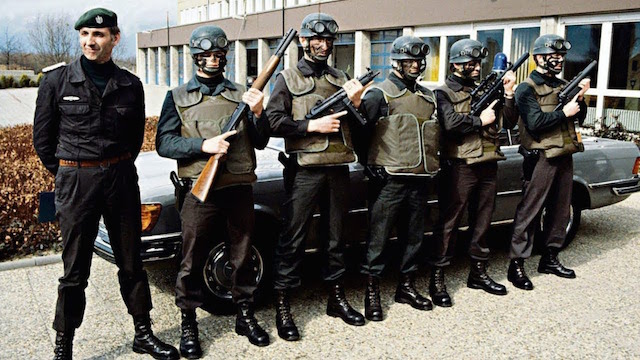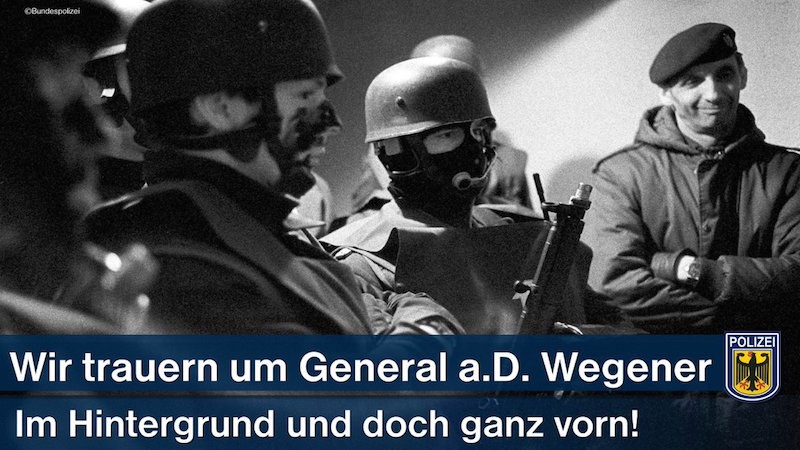Get the weekly SPARTANAT newsletter.
Your bonus: the free E-Book from SPARTANAT.

The father of the GSG 9 - Ulrich K. Wegener
Ulrich K. Wegener, founder of the GSG9 anti-terrorism unit in Germany, is remembered for his fearless leadership and dedication to ensuring public safety. His legacy lives on as his unit continues to serve as a model for elite counter-terrorism forces worldwide.
On October 18, 1977, members of Border Security Group 9 stormed a Lufthansa plane that had been hijacked the day before in Mogadishu. Leading the charge was Ulrich K. Wegenner. This mission made the founder and first commander of the first German anti-terrorism unit a legend. On December 28, 2017, the legendary former General of the Federal Border Guard died at the age of 88. Kaj-Gunnar Sievert portrays the "Father of the Nine".
Ulrich Klaus Wegener was born on August 22, 1929, in Jütebog, a town south of Berlin in Brandenburg. His father was an officer in the Reichswehr and served at a nearby military training area. At the age of 16, at the end of the war and during the Wehrmacht's defensive battle against the Red Army around Berlin, he was lucky not to be drafted into the Volkssturm. However, his war experiences strongly influenced him.
After his Abitur in 1950, he fell into the hands of the SED and was imprisoned for 18 months as a political prisoner. His crimes: distributing leaflets criticizing the SED.
After his release, he fled to West Berlin and eventually joined the police in Baden-Württemberg. However, since Wegener wanted to become an officer, he switched to the Federal Border Guard in 1958 and became a lieutenant in 1959. This was followed by transfers to the Inner German border, training, relocations - including serving as a liaison officer with NATO - and staff functions.
In 1970, he was finally transferred to a position that would define his life and work. Wegener became a liaison officer in the Ministry of the Interior. In a conversation with the author, he described his role as "Genscher's adjutant". The two men got along well and witnessed firsthand the disastrous police rescue operation on the night of September 5, 1972, at the Fürstenfeldbruck military airport near Munich. Several people lost their lives in the hail of bullets.
With his work, Wegener laid the foundation for a unit that is among the absolute elite worldwide and became a role model for other countries.
Shortly thereafter, the 43-year-old Federal Border Guard senior lieutenant was tasked with setting up a unit to provide the state with a means to prevent such failures in the future: the GSG9.
Wegener immediately got to work with his characteristic determination. At that time, there was nothing comparable in Germany. He personally selected his men. He analyzed past case studies and the enemy. Together with his team, he tested equipment and operational tactics. They gradually built up the unit. He thought outside the box from the beginning. Such an attitude was not universally well-received in the mid-seventies. Some federal states felt that the idea of a highly specialized anti-terrorism unit at the federal level was not appropriate. They feared an impact on the state level and preferred to handle operations with their own part-time units.
To bring his unit to the highest training standards, Ulrich K. Wegener also trained and attended courses with foreign special forces. A notable and not always positively received aspect in Germany was the opportunity to benefit from the experiences of Israeli special forces. A few years after the disaster at Fürstenfeldbruck and the deaths of nine Israeli athletes, Wegener was the first German to have access to these units. He later said that at that time, he first had to earn the respect of the Israelis, but once they accepted him and saw what he could do, it was no longer an issue. Wegener was also on-site in 1976 during the Israeli rescue operation in Entebbe, Uganda.
After years of training and reflection, the ultimate test came on October 18, 1977, in Mogadishu, Somalia, with Operation "Feuerzauber". After Wegener and his men tracked the hijacked "Landshut" for days, the raid took place at night. Ultimately, three of the four terrorists were killed, all hostages were freed, and Wegener led the action from the front. The then-Chancellor Helmut Schmid entrusted his political fate in the hands of the GSG-9 men.
Wegener was hailed as a hero and resisted being called "the hero of Mogadishu" throughout his life. He argued that they all did the work together. Initial attempts to present him with the Federal Cross of Merit alone were categorically rejected by him.
Wegener was later promoted to General and remained a sought-after anti-terrorism and security expert throughout his life.
Wegener's Legacy
Wegener's legacy for Germany is that with his work he laid the foundation for a unit that is among the absolute elite worldwide and became a role model for other countries. He provided the state with a means that, in an uncertain time with the dangers of terrorism and serious crime, represents the trump card when all negotiations have failed or are not possible.
Ulrich K. Wegener has made Germany a safer place.
GSG9 of the Federal Police online
KAJ-GUNNAR SIEVERT, born in 1965, has been working in various communication roles within the Swiss Department of Defense since 2001. Currently, he is the Head of Communication at armasuisse, the procurement and technology center of the ministry. Sievert holds degrees in psychology, business administration, and journalism from the University of Zurich. The former print journalist regularly writes articles on military topics for Swiss and foreign specialized journals and magazines. He has accompanied units and crews of various armies and services on their missions in different regions of the world. Sievert is a former commander of the Paratrooper Reconnaissance Company 17, a parachute special forces unit of the Swiss Air Force, about which he has also written a book (CLICK HERE). He served from 1987 to 2000 in the unit, eventually becoming its commander - HERE is his interview "The trend towards special forces will continue". The author is also on Facebook.
SPARTANAT is the online magazine for Military News, Tactical Life, Gear & Reviews.
Send us your news: [email protected]
Ad
similar
Get the weekly SPARTANAT newsletter.
Your bonus: the free E-Book from SPARTANAT.



